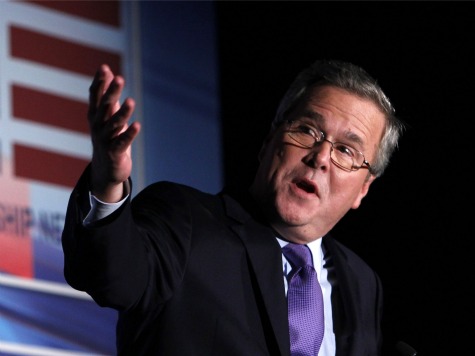From Bloomberg Politics:
Over the last several months, former Florida Governor Jeb Bush has been giving speeches, campaigning for candidates, appearing at public forums, and meeting with wealthy donors, which has led many people to believe that he may soon enter the race to become the next Republican presidential nominee. On Dec. 1, Bush told a gathering of business leaders at the Four Seasons Hotel in Washington that he would make a decision about his political future “in short order.” But Bush’s recent business ventures reveal that he shares a number of liabilities with the last nominee, Mitt Romney, whose career in private equity proved so politically damaging that it sunk his candidacy.
Documents filed with the U.S. Securities and Exchange Commission on Nov. 27 list Bush as chairman and manager of a new offshore private equity fund, BH Global Aviation, which raised $61 million in September, largely from foreign investors. In November the fund incorporated in the United Kingdom and Wales–a structure, several independent finance lawyers say, that operates like a tax haven by allowing overseas investors to avoid U.S. taxes and regulations.
BH Global Aviation is one of at least three such funds Bush has launched in less than two years through his Coral Gables, Fla., company, Britton Hill Holdings. He’s also chairman of a $26 million fund, BH Logistics, established in April with backing from a Chinese conglomerate, and a $40 million fund involved in shale oil exploration, according to documents filed in June and first reported on by Bloomberg News. His flurry of ventures doesn’t suggest someone preparing to run for president, according to a dozen fund managers, lawyers, and private-placement agents who were apprised of his recent activities by Bloomberg Businessweek. Most private equity funds have a life span of 10 years. While it isn’t impossible that Bush could bail on his investors so soon after taking their money, “that would be unusual,” says Steven Kaplan, a private equity expert at the University of Chicago Booth School of Business. One fundraiser for private equity adds that normally you’d be winding down such businesses, rather than expanding them, if you were going to run.
Until now, many people have assumed that Bush’s greatest challenge would be dispelling the perception among Republican primary voters that he’s a moderate in a party dominated by right-wing conservatives. In the wake of Romney’s bruising 2012 loss, however, Bush’s overseas funds, mysterious investors, and foreign entanglements could prove harder to overcome. As a budding private equity mogul, he’s begun to resemble a Mini-Mitt. Bush declined to be interviewed for this article.
“Running as the second coming of Mitt Romney is not a credential that’s going to play anywhere, with Republicans or Democrats,” says John Brabender, a Republican consultant and veteran of presidential campaigns. “Not only would this be problematic on the campaign trail, I think it also signals someone who isn’t seriously looking at the presidency or he wouldn’t have gone down this path.”
Bush, 61, was a popular governor from 1999 to 2007, earning a reputation in Florida as a serious-minded politician who stressed economic development and education standards. A real estate developer before going into politics, he surprised no one by returning to the private sector at the end of his last term. “His whole approach as governor was strongly pro-business,” says Matthew Corrigan, a political science professor at the University of North Florida and author of a new book,Conservative Hurricane: How Jeb Bush Remade Florida. “He essentially turned himself into the state’s chief economic development officer.”
Being governor didn’t do much to help Bush’s own bottom line. When he took office in 1999, public disclosure filings showed that his personal net worth was about $2 million. By the time he left in 2007, that dropped to $1.3 million. Upon leaving office, Bush made no secret of his desire to make money and embarked on a whirlwind of deals, partnerships, and advisory positions in aggressive pursuit of that goal. ANew York Times report in April found that he has earned at least $3.2 million in board fees and stock grants from public companies and given more than 100 speeches for which he is typically paid $50,000 each. At one time, he sat on six corporate boards.
Some of these arrangements proved problematic. In 2007, Bush became a paid consultant and director of a Miami building materials startup called InnoVida, whose founder went to jail after the company faked documents and misappropriated $40 million. (There’s no evidence Bush acted improperly.) In 2011, InnoVida went bankrupt.
Read the rest of the story here.

COMMENTS
Please let us know if you're having issues with commenting.